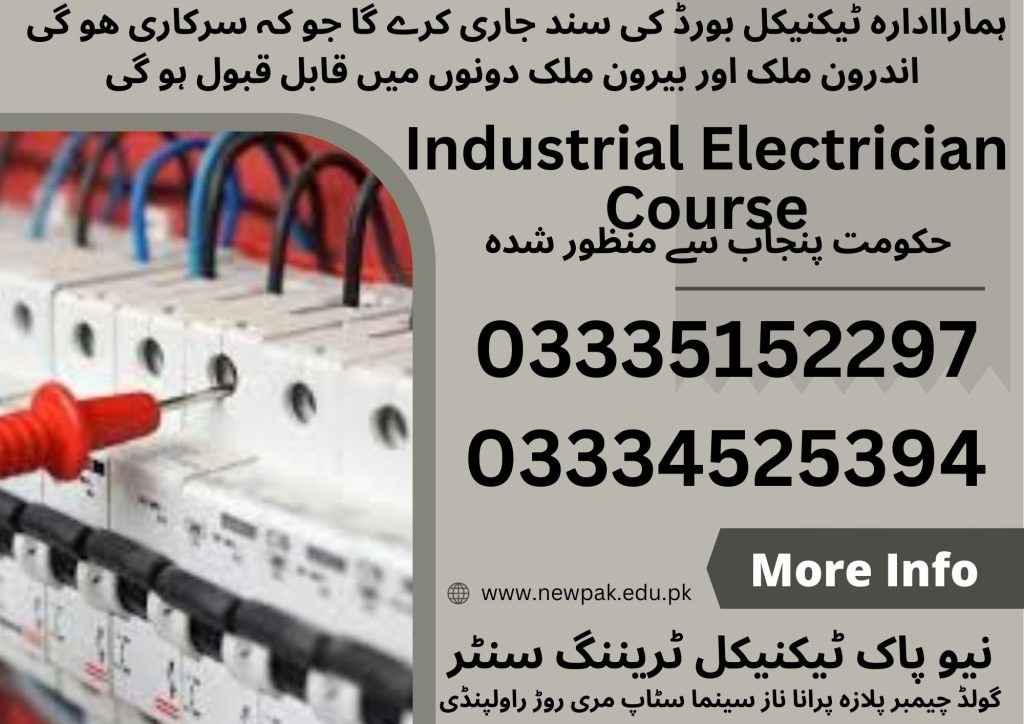Industrial Electrician Course In Rawalpindi Islamabad
The Industrial Electrician Course is a specialized electrical course designed to train students in handling electrical systems within factories and industrial environments. It focuses on installations, safety protocols, PLCs, and system troubleshooting, which is ideal for those pursuing advanced electrician courses.
Course Overview
This hands-on industrial electrician training combines theoretical knowledge with real-world practice in motor control, wiring, and renewable energy systems. Designed to meet the needs of the industrial sector, it prepares learners for skilled roles and certifications in electrician courses and electrical maintenance careers.

Course Duration
06 | Months
- Basic Electrical Theory & Industrial Systems
- Electrical Safety & Regulations
- Electrical Tools Usage & Maintenance
- Wiring & Electrical Diagrams
- Industrial Installations & Panel Setup
- Motor Control Basics
- Intro to PLC & HMI Systems
- Practical Workshop & Local Code
01 | Year
- Basic Electrical Theory & Industrial Systems
- Electrical Safety & Regulations
- Electrical Tools Usage & Maintenance
- Wiring & Electrical Diagrams
- Industrial Installations & Panel Setup
- Motor Control Basics
- Intro to PLC & HMI Systems
- Practical Workshop & Local Code Compliance
- Advanced PLC Programming & Protocols (Modbus etc.)
- Variable Frequency Drives (VFDs) & Soft Starters
- Motor Troubleshooting in Automation
- Industrial Sensors & Instrumentation
- Electrical Design & Renewable Energy Integration
- National & International Code Compliance
- Project Planning & System Documentation
- Emergency Response & Industry Case Studies
Course Outline (6 Months)
Introduction & Basic Electrical Theory
Month 1
- Overview of electrical systems in industrial settings
- Safety procedures and regulations
- Ohm’s Law and power calculations
- Basic electrical circuits and components
Electrical Tools & Diagrams
Month 2
- Identification and safe use of electrical tools
- Maintenance of electrical testing equipment
- Reading and interpreting wiring and schematic diagrams
Electrical Installations & Wiring
Month 3
- Cable tray installations
- Conduit bending and wiring methods
- Electrical panel installation basics
Motor Control Fundamentals
Month 4
- Types and characteristics of industrial motors
- Motor starters and basic control circuits
- Hands-on motor circuit connections and troubleshooting
Industrial Control Systems (Intro)
Month 5
- Basics of Programmable Logic Controllers (PLC)
- Human-Machine Interface (HMI) introduction
- Basic control logic and circuit development
Practical Workshop & Safety Compliance
Month 6
- Troubleshooting using diagrams and schematics
- Lockout/tagout procedures and PPE usage
- Final evaluation (theory and hands-on tasks)
- Compliance with local electrical codes
Course Outline (1-Year)
Months 1–6: Fundamental Industrial Electrician Course In Rawalpindi Islamabad
(Same course content as the 6-month program but with more detail, role-plays, software demos, and assessments.)
PLC & Communication Protocols
Month 7
- PLC programming and advanced logic functions
- Ladder diagrams and real-world PLC simulations
- Industrial communication protocols (Modbus, Profibus)
Advanced Motor Controls & Drives
Month 8
- Variable Frequency Drives (VFD) setup and operation
- Soft starters and motor protection systems
- Motor troubleshooting in automated systems
Instrumentation & Control Devices
Month 9
- Sensors, transmitters, and actuators in industrial systems
- Calibration techniques and fault analysis
- Signal types and data acquisition basics
Electrical Design & Renewable Integration
Month 10
- Electrical system design principles
- Load calculations and voltage drop analysis
- Introduction to solar and wind energy integration
Regulatory Codes & Project Planning
Month 11
- In-depth study of national/international electrical codes
- System documentation and layout planning
- Project management fundamentals for industrial projects
Emergency Response & Industry Applications
Month 12
- Emergency procedures in industrial environments
- Electrical risk assessment and disaster control
- Case studies from manufacturing, oil & gas, and telecom sectors
- Final assessments and course completion certification

Career Opportunities
- Industrial Electrician
- Motor Control Technician
- PLC Technician (Entry to Advanced Level)
- Electrical Maintenance Technician
- Instrumentation Technician
- Electrical Wiring Installer
- VFD & Automation Support Technician
- Electrical Safety Officer
- Renewable Energy Electrician (Intro-Level)
- Electrical Project Assistant / Planner
- HMI Operator / Support Technician
- Emergency Electrical Response Technician
Conclusion
The Industrial Electrician Course in Rawalpindi Islamabad provides comprehensive training in industrial electrical systems, preparing students for real-world applications in automation, maintenance, and control. This electrical course combines theory with practical experience, focusing on motor controls, PLC programming, safety compliance, and system diagnostics. As one of the most career-focused electrician courses, it enables graduates to work confidently in factories, plants, and the energy sectors. Completing this course equips individuals with the technical skills and certifications needed for successful employment in Pakistan’s growing industrial landscape.






